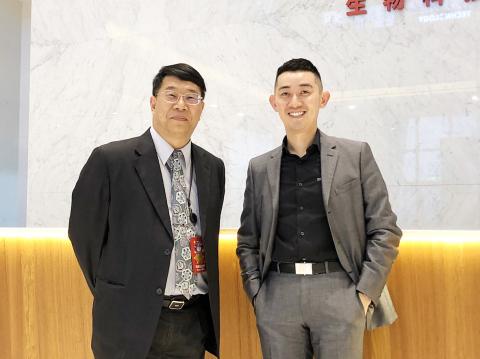Grape King Bio Ltd (葡萄王) yesterday said its Chinese unit, Shanghai Grape King Enterprises Corp (上海葡萄王), has performed sluggishly this year, posting a double-digit decline in sales to about NT$705 million (US$23.11 million) in the first 10 months.
The supplier of probiotics and mycelium health foods had expected the Chinese unit to post 50 percent annual growth in sales, Grape King Bio chairman Andrew Tseng (曾盛麟) told a media briefing in Taoyuan.
Shanghai Grape King was affected by lower orders from two of its major clients in China amid a slowing market dragged by stricter marketing regulations and falling consumer spending due to a US-China trade dispute, Tseng said.

Photo: Kao Shih-ching, Taipei Times
The unit mainly manufactures beauty drinks, such as those containing collagen, for corporate clients.
“Chinese customers are willing to spend on health foods, but they are reducing their spending due to uncertainty about economic development,” Tseng said.
Sales in China have posted annual declines every month since April, with third-quarter sales falling more than 50 percent from a year earlier, Tseng said.
The company expects its Chinese business to recover in the second quarter of next year due to a low comparison base and its diversification strategy.
It aims to gain 10 new clients with possible orders of more than 10 million yuan (US$1.42 million) each next year, Tseng said.
Shanghai Grape King would also begin offering probiotics next year to diversify its product range, he added.
In contrast, Grape King’s business at home remained rosy, posting a double-digit growth in sales in the first 10 months, while its direct-sales subsidiary, Pro-Partner Inc (葡眾), reported that sales rose 5 percent annually, Tseng said.
With a new plant in Taoyuan’s Longtan District (龍潭) beginning operations in July to supply more probiotic products, the firm’s Taiwanese business is expected to remain strong next year, he said.
Grape King has partnered with Uni-President Enterprises Corp’s (統一企業) distribution subsidiary to market more of its health food products, such as Come Best tonic drink, at President Chain Store Corp ( 統一超商) stores and drugstore chain Cosmed (康是美), Tseng said.
Meanwhile, GK Bio International Sdn Bhd, a joint venture by Grape King and Malaysia-based All Cosmos Bio-Tech Holding Corp (全宇生技控股), would begin marketing Grape King’s products next year after gaining approval from Malaysian authorities, Tseng said.
Overall, the company reported that consolidated revenue inched up 0.07 percent annually to NT$7.32 billion in the first 10 months, while net profit fell 1 percent annually to NT$880 million in the first three quarters.
Earnings per share totaled NT$6.49, compared with NT$6.57 last year, company data showed.

SEMICONDUCTORS: The German laser and plasma generator company will expand its local services as its specialized offerings support Taiwan’s semiconductor industries Trumpf SE + Co KG, a global leader in supplying laser technology and plasma generators used in chip production, is expanding its investments in Taiwan in an effort to deeply integrate into the global semiconductor supply chain in the pursuit of growth. The company, headquartered in Ditzingen, Germany, has invested significantly in a newly inaugurated regional technical center for plasma generators in Taoyuan, its latest expansion in Taiwan after being engaged in various industries for more than 25 years. The center, the first of its kind Trumpf built outside Germany, aims to serve customers from Taiwan, Japan, Southeast Asia and South Korea,

POWERING UP: PSUs for AI servers made up about 50% of Delta’s total server PSU revenue during the first three quarters of last year, the company said Power supply and electronic components maker Delta Electronics Inc (台達電) reported record-high revenue of NT$161.61 billion (US$5.11 billion) for last quarter and said it remains positive about this quarter. Last quarter’s figure was up 7.6 percent from the previous quarter and 41.51 percent higher than a year earlier, and largely in line with Yuanta Securities Investment Consulting Co’s (元大投顧) forecast of NT$160 billion. Delta’s annual revenue last year rose 31.76 percent year-on-year to NT$554.89 billion, also a record high for the company. Its strong performance reflected continued demand for high-performance power solutions and advanced liquid-cooling products used in artificial intelligence (AI) data centers,

Gasoline and diesel prices at domestic fuel stations are to fall NT$0.2 per liter this week, down for a second consecutive week, CPC Corp, Taiwan (台灣中油) and Formosa Petrochemical Corp (台塑石化) announced yesterday. Effective today, gasoline prices at CPC and Formosa stations are to drop to NT$26.4, NT$27.9 and NT$29.9 per liter for 92, 95 and 98-octane unleaded gasoline respectively, the companies said in separate statements. The price of premium diesel is to fall to NT$24.8 per liter at CPC stations and NT$24.6 at Formosa pumps, they said. The price adjustments came even as international crude oil prices rose last week, as traders

SIZE MATTERS: TSMC started phasing out 8-inch wafer production last year, while Samsung is more aggressively retiring 8-inch capacity, TrendForce said Chipmakers are expected to raise prices of 8-inch wafers by up to 20 percent this year on concern over supply constraints as major contract chipmakers Taiwan Semiconductor Manufacturing Co (TSMC, 台積電) and Samsung Electronics Co gradually retire less advanced wafer capacity, TrendForce Corp (集邦科技) said yesterday. It is the first significant across-the-board price hike since a global semiconductor correction in 2023, the Taipei-based market researcher said in a report. Global 8-inch wafer capacity slid 0.3 percent year-on-year last year, although 8-inch wafer prices still hovered at relatively stable levels throughout the year, TrendForce said. The downward trend is expected to continue this year,